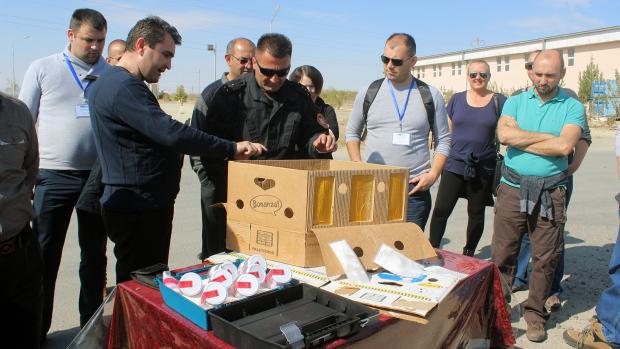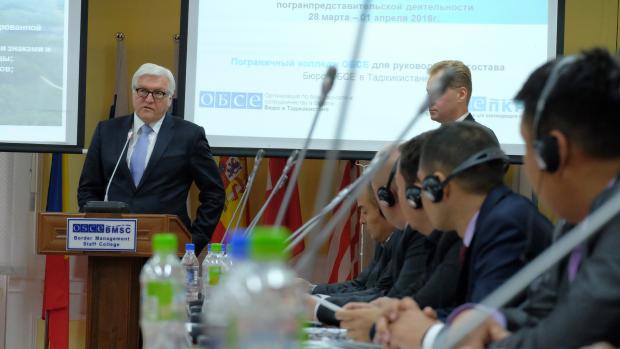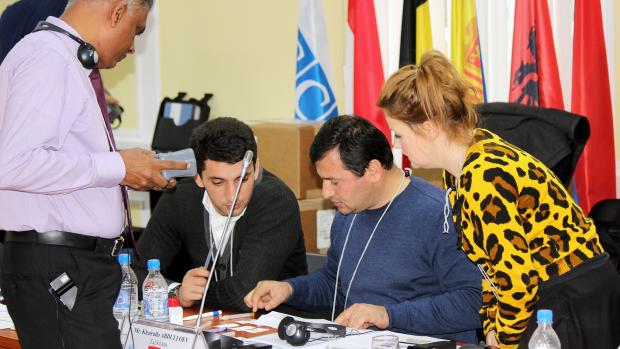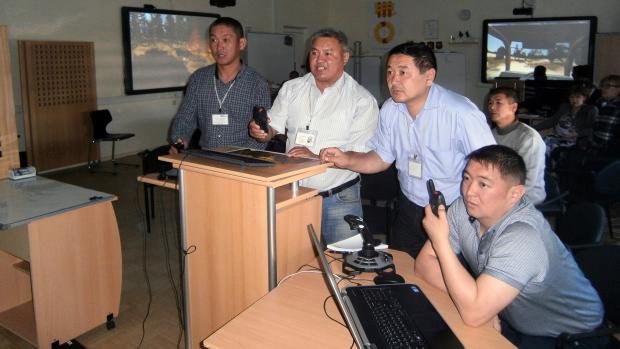OSCE Border Management Staff College – looking back at successes and planning for the future
“There is a lot of talk about co-ordinated border management, but you’ve got to pay credit where it is due. This is action. The Staff Course is reflective of people recognizing that something needs to be done to improve co-operation and then actually doing it,” says David Zeine, Inspector at the Customs Compliance Branch of the Australian Border Force.
Enhancing co-operation and communication among the border security and management officials from across the OSCE region has been a goal of the OSCE flagship initiative, the Border Management Staff College, since its inception nearly 9 years ago.
There is a lot of talk about co-ordinated border management, but you’ve got to pay credit where it is due. This is action. The Staff Course is reflective of people recognizing that something needs to be done to improve co-operation and then actually doing it.
David Zeine
Inspector at the Customs Compliance Branch of the Australian Border Force
After offering a wide range of short and longer duration courses to mid- to senior-ranking officials from across the OSCE region, the College is going through a transition that foresees more focus on long-term training initiatives such as the one-month Staff Course and the one-year Border Security and Management for Senior Leadership course (BSMSL).
Through its professional development portfolio, the College will continue supporting border security managers in further enhancing their conceptual and strategic thinking as well as developing and implementing more effective border security and management practices, policies and strategies.
Paulo Jorge Gonçalves Gomes, a Staff Course graduate from Portugal, was, by virtue of his attendance on the Staff Course, put in charge of representing his force in the national working group that created the National Integrated Border Management (IBM) Strategy and the related Action Plan.

The one-year BSMSL, a course that blends classroom and distance e-learning, will continue to help create a solid base on which participants will build their analysis of border security risks and challenges. This is the process that will lead to the development of strategic vision on how the existing and emerging threats can be addressed.
“I hope to see the BMSC management succeed in raising its BSMSL program to the level of MAS (Master of Advanced Studies) since the quality of the program is quite similar and at least on the same level of education and comprehension as MAS,” said Marius Cristea, a BSMSL graduate representing the General Inspectorate of the Romanian Border Police, who previously graduated from the MAS program in Security Studies at the University of Geneva, Switzerland.
The BMSC is currently seeking accreditation of its one-year course. In October a group of international experts visited the College to assess the content and the course delivery. Upon completion of the fact-finding mission, the Accreditation Commission presented preliminary conclusions stating that the course corresponds to the Sectorial Qualification Framework’s level 7.
The BMSC was first conceptualized back in 2008 with an intention to establish an OSCE-wide institution that would help promote implementation of the OSCE Border Management and Security Concept. Since its inception the college went through continuous refinement of its vision, curriculum, knowledge delivery methods and other aspects which comprise the success of an educational establishment.

As a part of this effort, the BMSC, together with its affiliates, introduced a number of customized educational opportunities, including those for current and prospective female leaders.
According to Fareshta Akbari representing the Afghan Border Police, there are very few learning and development opportunities provided to Afghan border officials, and even fewer that are accessible to female officers. The educational offerings delivered by the College provided the Afghan female officers with the unique opportunity to have more female officers attend such trainings, and work towards achieving the long-term goal of increasing the number of female leaders and decision makers in their ranks.
The BMSC is a specialized border security and management structure that serves as a unique OSCE initiative introducing officials to the latest methodologies, techniques and practices in the area of border security and management.
Mamuka Togonidze, a Staff Course graduate from Georgia, noted that knowledge acquired at the BMSC helped him improve his skills at assessing risks at state borders, planning and organizing border operations, using forces and technical means rationally, and helping develop leadership qualities.

Over the years of its existence, the College initiated and provided the opportunity for professional development and enhancement of competencies for over 3,200 officials from border security and management agencies of 42 OSCE participating States and 9 Partners for Cooperation.
To date, 156 short- and long-term courses and thematic events were delivered, including 19 one-month intensive Staff Courses and two one-year blended learning courses on Border Security and Management for Senior Leadership.
Tamulevičius Saulius, a Staff Course graduate from Lithuania noted that the experience exchange with colleagues during the Staff Course gave him an idea for a project aimed at improving motivation among his colleagues. Upon arriving home, he initiated and coordinated changes in the staff motivation system in his unit.
Within the next phase and in the framework of its core courses, the College will continue initiating dialogue among researchers and practitioners through College roundtables that will focus on new and emerging cross-border challenges.

Stanislav Filippov, Associate Professor at the National Academy of the State Border Guard Service of Ukraine said that the College continuously strives to address the most relevant topics of an international scope that cannot be resolved locally within a single nation. The value of the BMSC’s platform for communication for a scientist is in the opportunity to expand the horizon, to remove the subjectivity through exchanging knowledge and experience with peer researchers and practitioners from all over the world, as well as to get acquainted with the best practices of countering the transnational threats.
Mr. Filippov is a Staff Course graduate who participated in multiple educational initiatives of the College both as a participant and as an expert.
According to Alexander Eliseev, the BMSC Chief of Education, the College’s future lies in further strengthening ties among the border security managers, promoting information and best practices exchange among them, supporting development of their leadership potential, as well as helping to advance their training delivery skills, thereby enabling further dissemination of the greater knowledge they have accumulated during BMSC courses.

